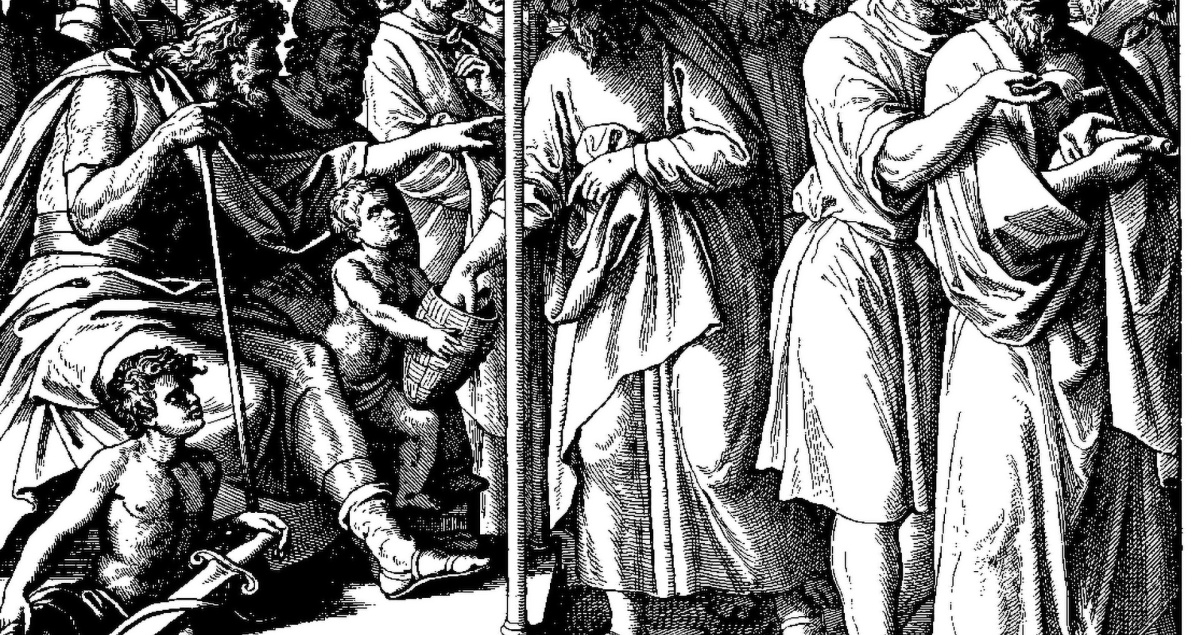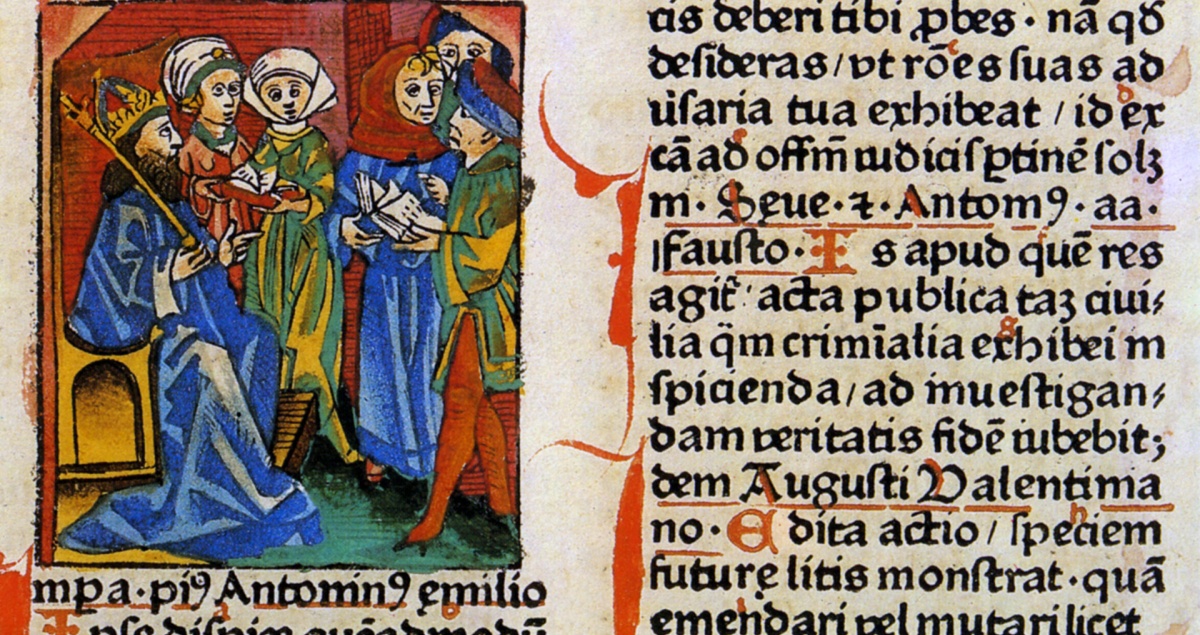Anyone who has tuned in to a sporting event in the past year or so has been subject to the nearly ubiquitous advertisements for sports gambling in one form or another. That’s certainly the case in the six states that allow online casino gambling, the seven states with online state-sanctioned lotteries, and the 26 states that allow mobile sports betting.
With the advent of online gambling and the legalization of sports betting, games of chance are lapping up greater and greater portions of Americans’ pastime. Is it best to forgo making that date with Lady Luck in the first place? Or can prudence distinguish between self-destructive sin and harmless diversions?
While gambling isn’t quite the world’s oldest profession, games of chance and wagers have been around for quite some time. As we live in a culture that is increasingly awash in digital opportunities to amuse ourselves to debt, what should we make of online gambling and sports betting? The dissonance for a Christian in this cultural moment is particularly acute, as our postmodern neopagan world more and more mirrors the bread and circuses of the early Church’s context in the Roman Empire.
It would perhaps be easy enough and wise as well to simply abjure all such worldly temptations offered by scantily clad ambassadors for the thrill of acquiring vast riches through a few taps on a phone screen. The Christian tradition certainly stands in clear opposition to the fomenting of vices like greed and pride. But the debates in Christian history over the status of lotteries, betting, and similar activities are much more complex than a simple binary of absolute affirmation or negation. This is, in part, because the scriptural witness itself seems to validate at least some forms of wagering or ancient analogues to games of chance.
Casting Lots in the Bible
To be sure, Scripture does not sanction, nor even directly address, gambling for money, especially in its modern form. But there are instances where something like an instrument of chance is used, particularly in relationship to the challenge of discerning God’s will.
The Urim and Thummim were sacred objects employed in the Mosaic dispensation, recorded in the Hebrew Scriptures. Their exact nature is unclear, and there has been a great deal of speculation about their appearance and how they were used, but they are sometimes referred to as “the sacred lots” (Deut. 33:8 NLT). They are usually understood by scholars to refer to some kind of device by which the will of God could be determined on a particular question. In this sense they are a special case of the phenomenon of casting lots described in the Bible.
The scriptural witness itself seems to validate at least some forms of wagering or ancient analogues to games of chance.
The technical term for the use of lots to discern God’s will is cleromancy, but it essentially refers to a process by which the priests or leaders might inquire of God and receive a sign of divine determination. Lots were cast in the Bible within a providentialist worldview; as the Proverb puts it, “The lot is cast into the lap, but its every decision is from the Lord” (Prov. 16:33). There is no hint in this context of some powerful metaphysical force like luck, fortune, or chance. Rather, lots are a mechanism intended to bridge the gap between the reality of God’s will and human ignorance of that will. Rather than reflecting some kind of belief in a cosmic capriciousness or chance, lots are a means of addressing an epistemic deficit.
The use of lots in the ancient near east is well-established, and there is extensive precedent for their use in ancient Israel and into the times of the apostles. Lots were to be used by the Aaronic high priest on the Day of Atonement (Lev. 16:8). Joshua used lots to determine the inheritance of tribes during the conquest of Canaan (Josh. 18:8). Lots were also used to determine inheritances and the division of property when there was uncertainty about the rightful claims or divine will concerning material provision.
Lots were also employed in other circumstances, including the designation of different divisions for different periods of priestly service (1 Chron. 24:5). It is in this context that we read in the New Testament that Zechariah was serving as a priest, and “he was chosen by lot to enter the temple of the Lord and burn incense” (Luke 1:9). This is where an angel foretells the birth of John the Baptist to Zechariah. Later in the New Testament era, lots are used to discern which of two candidates, Barsabbas or Matthias, is to take the place of the traitor Judas among the apostles. The account concludes, “They cast lots for them, and the lot fell on Matthias, and he was numbered with the eleven apostles” (Acts 1:26).

In John’s Gospel we read that Psalm 22:18—“They divided my garments among them, and for my clothing they cast lots”—was fulfilled when Roman soldiers divided up the spoils following Jesus’ crucifixion, and rather than tearing apart the seamless tunic, “cast lots for it to see whose it shall be” (John 19:24). Much of the later Christian reflection on gambling, wagering, luck, and chance are grounded in reception of these generally licit uses of lots to discern God’s will.
There are a few notable instances of something akin to betting or competition in Scripture as well. As recounted in Genesis (32:22–32), Jacob has a wrestling match with a mysterious man. Although there are no explicit stakes in the contest, Jacob earns a blessing, a new name, and a permanent limp for his striving. Later in the time of the judges, Samson wagers with 30 Philistines that they cannot solve his riddle: “Out of the eater, something to eat; out of the strong, something sweet.” The stakes are 30 sets of clothing and linen garments, and Samson loses the gamble due to the duplicity of his Philistine wife. Although Samson is a judge of Israel and a hero of the faith named in Hebrews 11, his actions are not typically understood as positive models for moral behavior, however.

The Fathers on Fortune
Among the church fathers, the strong providentialist perspective is upheld against an essentially pagan understanding of chance or fortune. And when something like luck or fortune is invoked, it functions as an epistemological rather than an ontological claim. Thus, for instance, Augustine likens God’s providential ordering of humankind and determination of where people live in relationship to one another as, from a human perspective, a kind of chance. In articulating the doctrine of subsidiarity in seminal form, Augustine writes that “all men are to be loved equally. But since you cannot do good to all, you are to pay special regard to those who, by the accidents of time, or place, or circumstance, are brought into closer connection with you.” These accidental relationships are to be understood as reflective of a kind of divine providential establishment: “Since you cannot consult for the good of them all, you must take the matter as decided for you by a sort of lot, according as each man happens for the time being to be more closely connected with you.”
Augustine’s understanding of divine providence is in sharp contrast to the pagans’ posture toward their own gods. Such gods have a realm of influence and power, and must be appeased so that their favor might be granted to human beings. But the relationship is always transactional and instrumental, and indeed, from the human point of view, fundamentally capricious and arbitrary. As Lactantius writes, Fortune is “a goddess mocking the affairs of men with various casualties, because they know not from what source things good and evil happen to them. They think that they are brought together to do battle with her; nor do they assign any reason by whom and on what account they are thus matched; but they only boast that they are every moment carrying on a contest for life and death with fortune.” He goes on to define fortune as “the sudden and unexpected occurrence of accidents,” whether positive or negative, but where the pagans ascribe these accidents to the caprice of their gods, Christians know that “fortune is nothing” and that “all the wisdom of man consists in this alone, the knowledge and worship of God.”
Augustine likens God’s providential ordering of humankind and determination of where people live in relationship to one another as, from a human perspective, a kind of chance.
Clement of Alexandria articulated a balanced and nuanced perspective on wealth and its proper administration. “Riches,” he says, “which benefit also our neighbours, are not to be thrown away. For they are possessions, inasmuch as they are possessed, and goods, inasmuch as they are useful and provided by God for the use of men; and they lie to our hand, and are put under our power, as material and instruments which are for good use to those who know the instrument.” Material fortunes, then, are not to be derided or cast aside as of no importance. Wealth and fortune can be put to good use in the service of others. But they are not to be sought solely for their own sake or used as a substitute for higher goods, and certainly not the highest good, God himself. The internal and spiritual state of the Christian is of primary concern, whether in riches or in poverty. “So also a poor and destitute man,” warns Clement, “may be found intoxicated with lusts; and a man rich in worldly goods temperate, poor in indulgences, trustworthy, intelligent, pure, chastened.”
Scholastic Distinctions
The right use of riches remained a consistent theme of Christian reflection on wealth throughout the Middle Ages. For Aquinas, profits made from games of chance are treated along with wealth gained from prostitution and simony. In his commentary on Peter Lombard’s Sentences, as in his Summa Theologiae, Thomas makes distinctions between participants in games of chance, especially whether someone has been taken advantage of in the relationship. He treats gambling profits in the context of whether such money can licitly be given as alms. “The winnings themselves of gamblers are prohibited by law,” writes Thomas, but given that this is not always enforced or can be permitted given different cultural contexts, he goes on to distinguish between winnings from people who cannot lawfully lose their own property (e.g., minors), and those who can. In the latter case, the civil law of the land must be taken into account as well as the requirements of divine law. “If one has played with someone who has the power to dispose of what is his, if he is drawn into the game and loses, he can seek restitution,” writes Aquinas, because he has been taken advantage of by someone like a professional swindler. If the one drawn into the game by the swindler wins, however, “he is not bound to return the winnings; for the man who has lost is not worthy to receive, nor can he licitly keep; unless positive law were abrogated anywhere by the opposite custom.”
Aquinas, along with other medieval scholastics, was keen to explore the nuances of the relationships involved in various endeavors. With respect to what to do with money gained from gambling and games of chance, the moral judgment turns on the details of the positive law of the land, the relationship between the participants, and the larger moral context. If someone were to win money illicitly from someone else, either because that person was taken advantage of by reason of age or intelligence, or someone gambles “with the desire of making money out of another man, entices him to play, and wins from him by cheating,” that money is taken unjustly and ought to be returned to the person it is taken from. It therefore cannot be given lawfully as alms to someone else. The positive civil law, following the Justinian code, prohibits such profits altogether, albeit typically without further civil penalty beyond the duty to restore what has been lost. But it is possible that there are situations where that law has fallen into disuse or a contrary custom prevails. In such cases, direct restitution may not be required, and almsgiving out of such gain is always the better course.

The Uses and Abuses of Lots
The Protestant Reformers generally took a jaundiced view toward gambling and games of chance. Luther distinguished gains from gambling from the technical injunctions against usury, but such gains were not without moral taint: “Money won by gambling is not usury either; yet it is not won without self-seeking, self-love, and sin.” Such activities were outlawed in Geneva (along with other morally dubious activities such as dancing, masquerading, and bawdiness), and one traveler at the time observes that “games of chance are not customary” in the Reformation city. For Calvin it was essential to discern the proper use of something from its abuse. In the case of lots, he deems it entirely legitimate for civil authorities to use lots to determine the distribution of some good where there is no other just option for deciding ownership. “Those men who think it to be wickedness to cast lots at all, offend partly through ignorance, and partly they understand not the force of this word,” writes Calvin. “There is nothing which men do not corrupt with their boldness and vanity, whereby it is come to pass that they have brought lots into great abuse and superstition. For that divination or conjecture which is made by lots is altogether devilish. But when magistrates divide provinces among them, and brethren their inheritance, it is a thing lawful.”
The most substantial and influential work concerning lots, lotteries, and chance more generally was penned by the Puritan divine Thomas Gataker (1574–1654). His 1619 treatise, Of the Nature and Use of Lots, sought to discern the proper use of such activities from their abuse and corruption. Like Calvin, Gataker thought that Scripture clearly sanctioned such devices within certain limits. “The use of lots and lottery, as it is very ancient, so has been in all ages no less frequent among men of all sorts,” writes Gataker. “And considering that those things that are most in use are by means of man’s corruption most subject to abuse, it ought not to seem strange if the like has among the rest befallen lots, if having been so much in use, they have not been free from abuse.” The legitimate use of lots, as Gataker understood and applied the Christian teaching, had to do with matters of uncertainty or doubt. They could be licitly used to make a determination where there was some epistemic shortfall on the part of humanity. Thus, asserts Gataker, a lot is an “event purposely applied to the deciding of some doubt.” For Gataker, where there is some element of skill or human technique involved, then the device ceases to be a lot or lottery. Lotteries are, from the human side, mechanisms of pure chance. And their purpose is to provide some determination in a matter of doubt or uncertainty. Where there is no other rational or just means of determining ownership, for example, or for distributing some good, then appropriately constructed lotteries can be used as a means of determining just distribution.
State Lotteries and Christian Social Teaching
As moral theological reflection developed along with technical devices in the centuries following the Reformation, Christian engagement with gambling, games of chance, lotteries, and the like became increasingly sophisticated. The 19th-century Thomist moral theologian and Roman Catholic clergyman John J. Elmendorf judged that “bets, gambling, lotteries are not immoral per se, as contracts, but through attendant evils.” Similarly, the catechism of the Roman Catholic Church teaches that “games of chance (card games, etc.) or wagers are not in themselves contrary to justice. They become morally unacceptable when they deprive someone of what is necessary to provide for his needs and those of others. The passion for gambling risks becoming an enslavement.”

Hewing closely to the examples given in scripture, the Christian tradition had long held that it was legitimate for authorities, particularly civil authorities, to use lots to distribute goods in the absence of other reasonable means of discerning just allotment. But as state powers grew more robust and ingenious in the 19th and 20th centuries, the public regulation and promotion of gambling became more and more significant. The arguments for the state monopolization of lotteries are twofold. First, private lotteries and numbers games are inherently subject to abuse, and so if people are going to participate in them, it is better for them to be run by trustworthy and disinterested authorities. And second, and somewhat in conflict with the first rationale, the profits from public lotteries will be put to good use as a contribution to the common good. In many cases, for example, the profits from state lotteries are earmarked to support public education. This incentivizes governments to promote gambling as a kind of public service.
The popularity of such state-sponsored and promoted gambling is tremendous. Forty-five of the 50 states have government lotteries (Alabama, Alaska, Hawaii, Nevada, and Utah are the holdouts). In addition, there are two major lottery systems—Mega Millions and Powerball—that operate across states and are functionally nationwide. State lotteries have become a kind of inversion of the traditional Christian sanction of lotteries. Where the civil authorities previously had a kind of monopoly on legitimate use of lotteries to determine the just distribution of goods in exceptional cases, modern states have promoted gambling itself as a kind of civic virtue and a form of public service.
Online Gambling and Sports Betting
With the advance of information technology and portable digital devices for accessing the internet, the pace and sophistication of gambling and betting techniques have grown exponentially. In recent years numerous states have not only promoted gambling through their own state-run lotteries; they have increasingly legalized access to gambling through other entities, particularly digital sportsbooks and casinos. Bets can be placed on card games and other games of chance through mobile apps, and wagers can be placed on sporting events ranging from basketball and football to soccer and hockey.
While nothing like a sports betting app on a cellphone could be imagined by the moral theologians of previous centuries, the wisdom of Christian moral reflection on gambling does have some significant lessons to teach us as we attempt to grapple with rapidly changing cultural mores and legal norms. There are at least three important aspects of gambling that bear on new digital realities.

First, incentives, motivations, and relationships matter. We know this both from economics as well as the moral and theological analysis of economic transactions. It would be hard to argue that for-profit casinos and online sportsbooks are operating out of altruism or charity. Rather, these enterprises ultimately trade on a very simple proposal: Put some of your money at risk and you might win more, in some cases much more, than you risked. The house always wins is a truism for a reason, and the motivations of people opening up an app to place a bet or pressing the max bet option on a slot machine might be varied, but there should be no illusions about who is trying to profit from whom. In this way, sportsbooks and casinos might be standing in a somewhat better moral position relative to state-promoted gambling enterprises that masquerade as forms of public service.
Second, and deriving from considerations of the incentives at work, is the question of inducement. Theological considerations rightly focus on the status of those who are at the most risk for abuse, oppression, or mistreatment. Where the stronger overpowers the weaker, the Christian moral tradition brings its prophetic energy to bear on the side of the victimized and the downtrodden. This is why Aquinas is concerned that restitution is the proper response to loss when someone has been cheated in a game of chance or has otherwise been mistreated or misled. The sophistication and finesse of marketing in the gambling world is remarkable, and Christians must develop the virtues to resist powerful inducements to engage in risky behavior.
The question of skill is also relevant for a moral evaluation of gambling, betting, and games of chance. Not all forms of gambling are created equal in this sense. From a merely human standpoint, there is always an element of chance or luck involved in how things turn out, whether in sports, in cards, or in life. Christians understand these factors to be a matter of divine providence and in some real sense beyond human control or influence. Who but God can ultimately account for how a football bounces? But there are games that are more or less absolutely about randomness and contests that are more or less dependent on the skill and abilities of human participants. Poker is not the same as roulette in this regard, and football is not the same as Powerball.
There are clear moral and spiritual risks to betting material goods on games of chance.
What Does It Profit?
In teaching his followers about the relative valuation of temporal and eternal goods, Jesus asks, “What does it profit a man to gain the whole world and forfeit his soul?” (Mark 8:36. A modern adaptation of this question might run something like this: What good is it for you to hit that 3-leg parlay and lose your spiritual life?
There are clear moral and spiritual risks to betting material goods on games of chance. Our hearts can be so set on acquiring more and more that we lose perspective of what is truly important. Perhaps in his own way, Satan is offering us some version of “the kingdoms of the world and their glory” (Matt. 4:8) through our smartphones. There is clearly, then, much to lose from gambling, losses that exceed merely material and economic realities.
So abstention might well be the wisest course of action. At the same time, God has created human beings as creatures that are fitted for play as well as work. C.S. Lewis once observed that it is inevitable that Christians will rest and play, and it is therefore of utmost importance to discern where such rest and play might be undertaken innocently and without sin. Christian engagement with something like gambling, which seems to have a narrow and yet potentially licit moral scope, is in this way a particular version of the question of how a Christian is to relate to the world and culture more broadly. Certainly there are real dangers and existential threats to living in this world and in this culture. But can the responsible response truly be wholesale withdrawal?
In a particular and individual case, the answer can be yes. Alcoholics must abstain from drinking. Pornography is in every case immoral. And the same kinds of moral considerations have led preachers and theologians to denounce games of chance, theater, television, and many other forms of cultural expression throughout history. But if gambling even in some limited sense is not to be intrinsically denounced as immoral, then keen judgment becomes even more necessary for discerning its proper use.
And this is precisely where questions of responsible discipleship and Christian stewardship come to the fore. It turns out that, given the vagaries of human psychology, how we acquire money influences how we treat it. Our motivations here are critically important. Are we engaging in gambling, buying lottery tickets, or putting $50 on the Detroit Lions to make the playoffs next year simply as a kind of innocent form of play? Or are we really and truly focused on getting a hit of dopamine from winning or how we might spend the winnings on ourselves?
“The love of money is a root of all kinds of evils,” the apostle warns us. “It is through this craving that some have wandered away from the faith and pierced themselves” (1 Tim. 6:10). Gambling may in some instances be morally permissible, but it is always dangerous. Grappling responsibly with these kinds of dilemmas and temptations is a constant feature of life in this fallen world. As Augustine lamented, “When I am in trouble I long for good fortune, but when I have good fortune I fear to lose it. Is there any middle state between prosperity and adversity, some state in which human life is not a trial?”
We might, in response to these realities, take some biblical wisdom to heart and ask for “neither poverty nor riches” (Prov. 30:8). And we might think twice before placing that bet.




